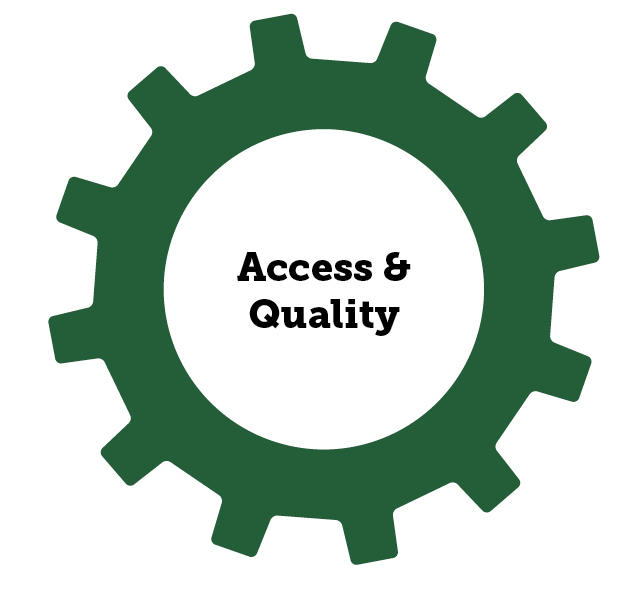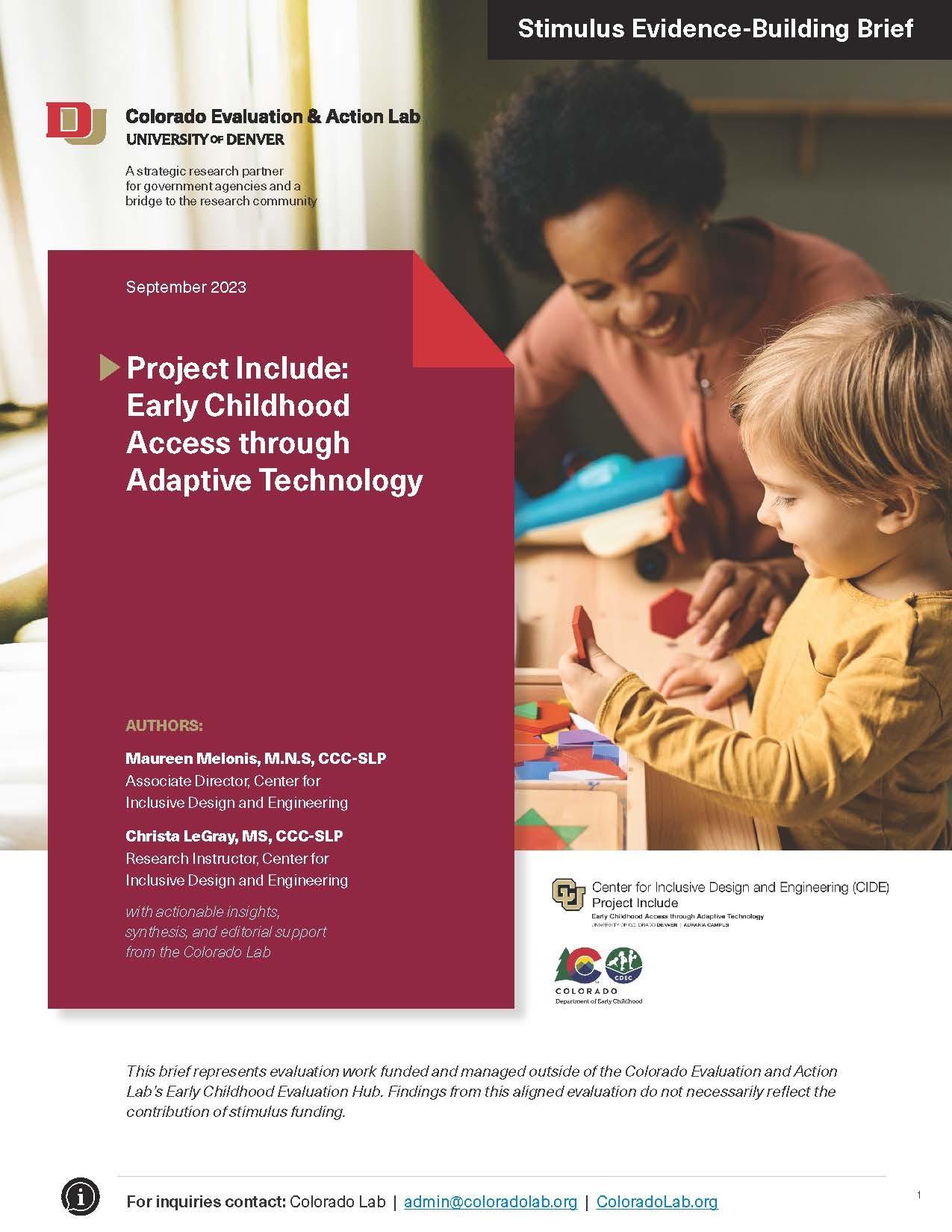Access to Inclusive Care
The Need
During the 2020 Colorado Shines Brighter Needs Assessment, one in seven Colorado parents identified their child as having a delay, disability or special need. Of those, one-third indicated that their preferred child care provider was unable to accommodate their child. Unfortunately, most providers experience limited professional development support for learning to modify classroom environments and materials to be accessible for all children. It is for these reasons that Colorado identified increasing inclusivity and access for children with special needs as one of the early childhood system’s twelve key needs.
The Strategy
Available to all Colorado-licensed child care programs at no cost, Project Include provides three phases of training and support that providers can access on their own schedule to learn about implementing inclusion and Universal Design strategies in all areas of development. Project Include builds on the CO Early Learning: Universal Design and Inclusion project, as well as adaptive loan libraries offered through Early Intervention Colorado and the Colorado Department of Education. CDEC offers this program in partnership with University of Colorado Denver's Center for Inclusive Design and Engineering.
See below for a detailed description of the Project Include three-phase approach: training, providing Universal Design and Inclusion Kits and coaching.
Key Outcomes and Learnings
There is a high level of demand and engagement among providers (49 counties) and satisfaction with materials and coaching provided. Partnerships with local communities through the library courier system and local early childhood councils (ECCs) are essential to widespread availability throughout Colorado.
- 933 providers submitted General Interest Forms to get connected with Project Include, indicating high interest statewide
- 23 ECCs and 1 community partner have committed to housing and distributing Universal Design and Inclusion Kits locally
- 61 applicants have requested Technical Assistance (TA)
- 21 have completed TA
- 100% of TA participants "strongly agreed" or "agreed" they were satisfied with technical assistance
- 2,320 views of Universal Design and Inclusion Kit instructional videos on YouTube as of March 1, 2024
- 371 Professional Development Information System (PDIS) "Introduction to Universal Design" training completions
- At least 1 provider in 43 counties completed this training
Monthly Data Review Sheets

Funding
Amount: $2,528,281
Sources:
- American Rescue Plan Discretionary
- Coronavirus Response and Relief Supplemental Appropriations (CRRSA)
Expiration: September 30, 2024
Next Steps
- Project Include and CDEC staff will conduct evaluation of the project summer 2024 via surveys and focus groups.
- Project Include and CDEC staff will continue to discuss sustainability of the project. The instructional videos attached to the Universal Design and Inclusion Kits will remain available on YouTube. The partnership with early childhood councils and local community programs to house and distribute the kits has been going well as a pilot experience; this bodes well for future sustainability.
Evidence Brief
"Project Include: Early Childhood Access through Adaptive Technology"
Center for Inclusive Design and Engineering, University of Colorado Denver
(September 2023)
A Three-Phase Approach
Part 1: Training
Child care providers complete an Introduction to Universal Design training through the Colorado Shines Professional Development Information System (PDIS), for which they receive 1.5 hours of continuing education credit. This training is available in both English and Spanish.
Part 2: Universal Design and Inclusion Kits
Programs are invited to check out one of our Universal Design and Inclusion Kits available to loan. Kits are available in five topic areas:
- Infant
- Communication and literacy
- Behavior and cognition
- Fine and gross motor
- Vision and hearing
Each kit contains 20-30 pieces of adaptive equipment to support that area of development. Each piece of equipment has a QR code that links to a short instructional video on how to use it to support inclusion in early childhood. Programs can borrow one of the kits, which are distributed via public libraries throughout the state through the interlibrary loan courier or local early childhood councils, for six weeks. Once the provider returns a kit, they are then eligible to check out another.
Part 3: Coaching
Programs can apply for Customized Coaching and Materials Support from experts at University of Colorado's Center for Inclusive Design and Engineering. This program identifies a challenge area for the provider related to including all children, and providers receive one-on-one coaching from our team of experts to improve in that area. At the end of coaching, the coach will recommend and purchase adaptive equipment for the program to keep. Coaching is available in both English and Spanish.
Quotes from Participants
“I have a child who is bilingual who did not talk much or interact with his peers in the fall. I started working with Project Include coaches in February to learn how to use different types of communication support. In April, he began to approach his peers to play with them, and I heard him use small phrases to communicate with them. What a rewarding experience!”
Family Child Care Home Provider, Garfield County
“It was an absolutely wonderful experience. When I first got the information about Project [Include] and about the inclusion training, I didn't have a clue what it was about and thought this was just like any other training... I was astonished by what it was offering and so excited for each part of the project. My coach, Christa, has been absolutely wonderful. I learned a lot and realized that simple things can be used to help children. I believe anybody who works with children needs to utilize this [project] whether their children have delays or not, because every aspect of the project helps all of the children and especially those with delays.”
Family Child Care Home Provider, Mesa County

